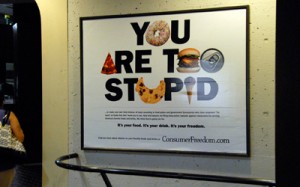Of all the would-be dietary dictators, wannabe syrup-saboteur MeMe Roth is perhaps the most freely contemptuous and openly hateful toward those who would choose the simple pleasures of food and drink, whatever their weight. We, however, suspected she wasn’t alone in thinking America’s food consumers were mere children, so a few years ago, we helped the “moderate” food police express their opinions of Washingtonians’ cherished personal decision-making power in simple terms:
Now we know MeMe’s not alone, and we don’t even need to “help.” In yesterday’s Los Angeles Times, one columnist laid out his contempt of consumer choice:
I know, I know: People should be able to eat whatever they want, and government officials have no business passing nanny-state rules that meddle in basic notions of life, liberty and the pursuit of happiness, blah, blah, blah.
If only it were that simple. The harsh reality is that millions of Americans can’t be trusted […].
Since we “can’t be trusted,” what does the columnist propose be done to our choices? Joining Robert “We I.D. For Soda” Lustig, he says, “I think it’s time that food and drink received the same level of regulatory oversight as tobacco and alcohol.” Prepare to be carded for that morning doughnut.
Apparently the columnist didn’t get the memo: To the “sophisticated” food cop like Kelly “Twinkie Tax” Brownell, Americans are victimized “food addicts,” not children. (Although Brownell hasn’t called himself an “addict” despite being less than svelte.)
Nevertheless, those four words—“Americans can’t be trusted”—signify a lot. In politics, pundits call that sort of saying a “Kinsley gaffe,” a secretly held truth that isn’t supposed to be expressed. We’ve long suspected that the food police mentality stemmed from a lack of respect for Americans’ ability to make their own choices. Now we know that lack of respect is right at the heart of the food-police mentality.
There’s also a superficially clever bit of activist strategy going on here: By convincing Americans that they are “McVictims,” to borrow one physician’s phrase, the activists turn Americans’ concentration from improving their own health to punishing bogeymen. Of course, the game only works if people trust that activists are motivated by something other than contempt for those who would make their own choices. On top of claims that beliefs in personal responsibility are “prejudicial attitudes,” this columnist’s assertion that we “can’t be trusted” throws that contempt into stark relief.



